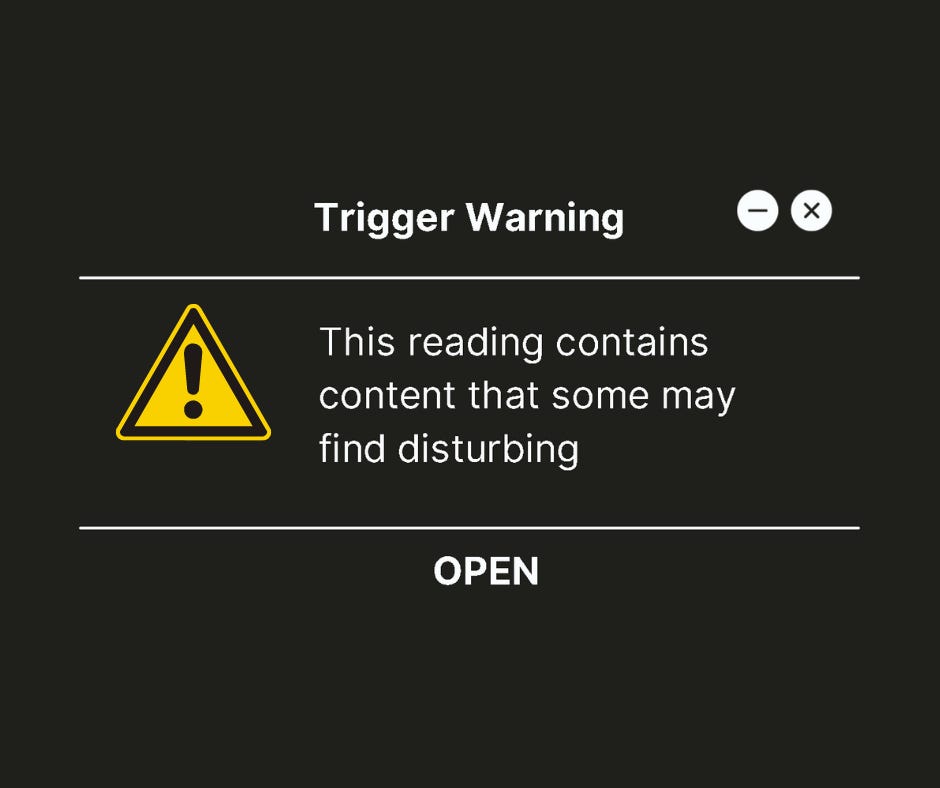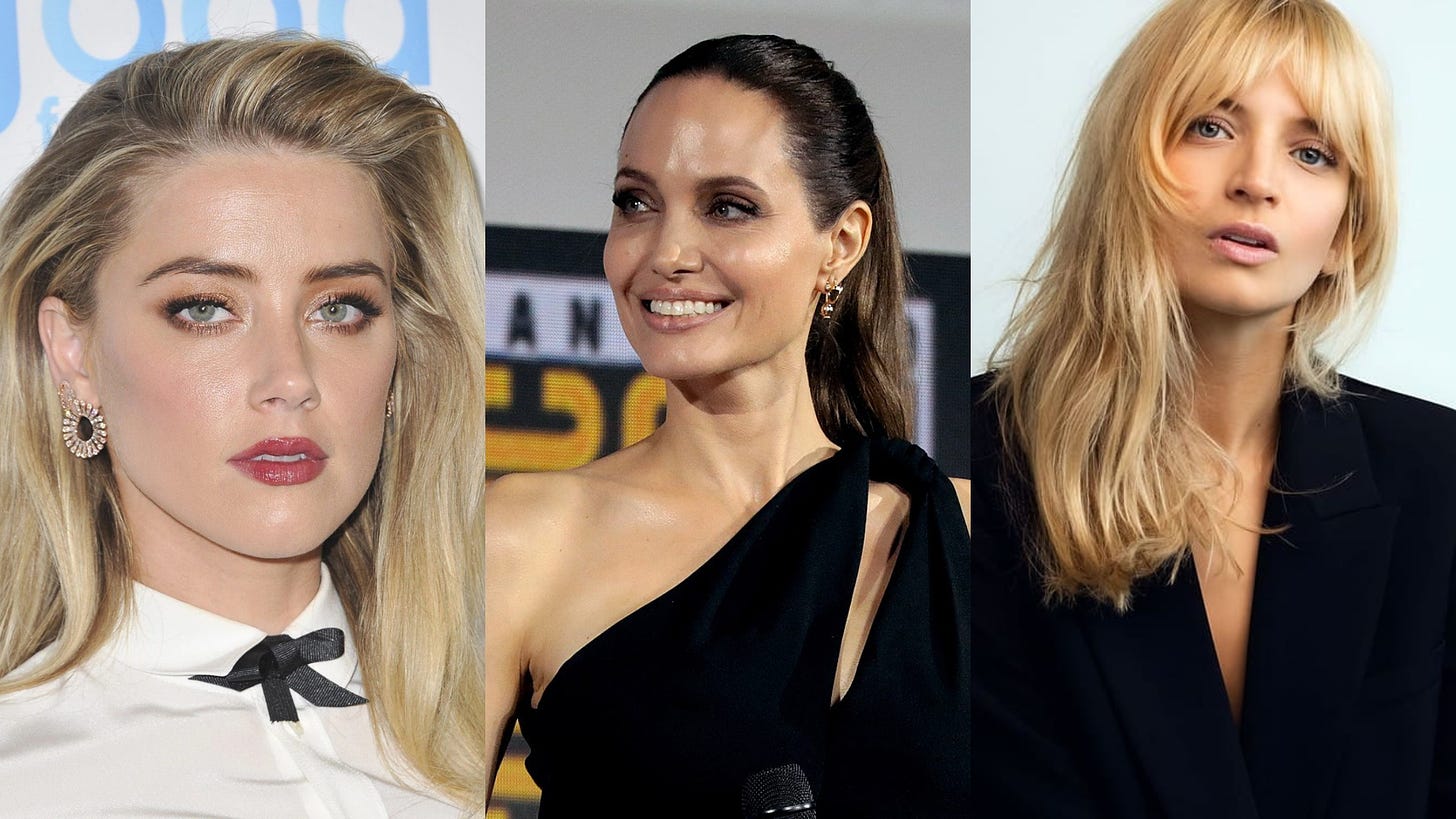High-Profile Domestic Violence Cases in Hollywood: A Deep Dive into Division, Accountability, and Industry Culture
Abuse In The Culture - 11/19/2024
Trigger Warning: This newsletter contains discussions and references to abuse, including emotional, physical, and sexual abuse. It’s understood that these topics can be distressing and may trigger intense emotional responses.
Domestic violence (DV) cases involving Hollywood stars often spark massive public discourse, not only due to the stature of the individuals involved but also because of the controversies they ignite. The cases of Amber Heard vs. Johnny Depp, Jonathan Majors vs. Grace Jabbari, and Angelina Jolie vs. Brad Pitt illustrate how the intersection of celebrity status and allegations of abuse polarizes public opinion. They also raise critical questions about accountability and the entertainment industry’s culture of allowing alleged abusers to continue their careers unabated.
This article examines these cases, explores the societal divide they exposed, and delves into the broader systemic issues in Hollywood.
The legal battle between Amber Heard and Johnny Depp was one of the most widely publicized domestic violence cases in recent history. It began in 2016 when Heard accused Depp of physical and emotional abuse, filing for a restraining order. Depp denied the allegations and later filed a defamation lawsuit against Heard over a 2018 Washington Post op-ed where she described herself as a victim of abuse, though she did not explicitly name him.
The 2022 trial, live-streamed to millions, divided public opinion. Fans of Depp rallied behind the actor, painting him as a victim of false accusations, while Heard supporters emphasized the societal tendency to discredit survivors of abuse. Testimonies revealed a toxic relationship marked by mutual dysfunction and alleged violence on both sides. Ultimately, Depp won the defamation case, with the jury awarding him $10 million in damages, though it also found that he defamed Heard in one instance, awarding her $2 million.
The fallout extended beyond the courtroom. Depp, initially dropped from major franchises like Fantastic Beasts, began rebuilding his career, receiving standing ovations at the Cannes Film Festival in 2023. Heard, on the other hand, faced public vilification and professional setbacks. Critics of Hollywood questioned whether Depp’s resurgence symbolized a broader tendency to forgive alleged abusers when they hold enough star power.
Jonathan Majors, one of Hollywood's rising stars with critically acclaimed performances in films like Creed III and Ant-Man and the Wasp: Quantumania, faced allegations of domestic violence in early 2023. His ex-girlfriend, Grace Jabbari, accused him of assault, claiming he had struck her during an altercation in New York. Majors was arrested, and the case remains unresolved as of late 2024.
In response, Majors vehemently denied the accusations, filing his own domestic violence complaint against Jabbari. His legal team presented evidence suggesting that Jabbari was the aggressor, and Majors’ supporters questioned the validity of the allegations, especially given the lack of a conviction.
Despite the unresolved nature of the case, Majors’ career took a substantial hit. The actor was dropped by his talent agency and public relations firm, and rumors swirled about Disney reconsidering his involvement in upcoming Marvel projects. However, some noted that Majors continued to be cast in high-profile roles, indicating Hollywood’s reluctance to sever ties with a bankable star entirely.
The public reaction mirrored the divisions seen in Depp and Heard's case. Social media users and commentators argued over whether Majors was being prematurely "canceled" or if the allegations warranted a more cautious approach to his career.
Unlike the highly publicized Depp-Heard trial, Angelina Jolie and Brad Pitt’s dispute over alleged domestic violence unfolded largely behind closed doors. In 2016, Jolie filed for divorce, citing irreconcilable differences. It later emerged that she accused Pitt of abusive behavior during a private plane flight, where he allegedly physically assaulted her and their children.
Though Pitt denied the accusations and was cleared of criminal charges after an FBI investigation, Jolie maintained her claims in subsequent legal filings. The case took another turn in 2022 when Jolie alleged in court documents that Pitt had sought to silence her through non-disclosure agreements and litigation tied to their joint business ventures.
Public opinion on the matter has been more subdued compared to other high-profile DV cases, possibly because both stars have avoided sensationalizing the proceedings. Nevertheless, the case sparked discussions about power dynamics in relationships, the challenges of proving abuse without explicit evidence, and the legal system's limitations in addressing familial abuse.
Pitt’s career remained largely unaffected. He continued starring in blockbuster films like Bullet Train and Babylon, while Jolie took on fewer acting roles, focusing on directing and humanitarian work. Critics have argued that Pitt's continued success, despite serious allegations, underscores Hollywood's tendency to insulate its male stars from accountability.
One recurring theme in these cases is the intense division they create among the public. Fans of Depp, Majors, or Pitt often rally behind their favorite stars, questioning the motives and credibility of their accusers. Conversely, supporters of Heard, Jabbari, or Jolie argue that societal biases and power dynamics work against victims, particularly women.
Several factors contribute to this polarization:
Celebrity Adoration: Many fans find it difficult to reconcile accusations of abuse with their admiration for a star's work, leading to defensive reactions.
Social Media Amplification: Platforms like Twitter and Instagram amplify these cases, turning them into battlegrounds for debates that often devolve into harassment campaigns.
Gender Dynamics: In cases involving male abusers and female victims, societal biases often lead to victim-blaming. Conversely, when men claim to be victims, they face skepticism about their masculinity and credibility.
One of the most glaring issues highlighted by these cases is Hollywood’s selective accountability. Allegations of abuse do not uniformly derail careers, especially for male stars who are deemed profitable.
Examples of Hollywood’s Forgiveness
Johnny Depp: Despite initial fallout, Depp rebounded after winning his defamation case.
Brad Pitt: Allegations of child abuse have not significantly impacted his career.
Mel Gibson: Despite a history of abusive behavior and racist tirades, Gibson continues to work in Hollywood.
The Cost for Female Stars
In contrast, women accused of similar behavior—or even those who accuse male stars—often face harsher consequences. Amber Heard, for instance, struggled to find work after her publicized battle with Depp, even as evidence suggested mutual abuse.
The entertainment industry’s treatment of domestic violence cases reveals systemic flaws:
Profit Over Ethics: Studios often prioritize box office potential over accountability, especially when allegations are not legally substantiated.
Double Standards: Men in Hollywood are often given second chances, while women face career-ending consequences for similar behavior.
Silencing Victims: Non-disclosure agreements and the threat of legal retaliation frequently deter victims from coming forward.
To address these issues, the industry must adopt a more transparent and consistent approach to handling allegations of abuse. Possible measures include:
Independent Investigations: Establishing independent bodies to assess abuse allegations can reduce bias and ensure accountability.
Zero-Tolerance Policies: Studios should adopt policies that temporarily suspend accused individuals during investigations, regardless of their star status.
Support for Survivors: Creating safe spaces for victims to report abuse without fear of retaliation is essential.
Ultimately, the public plays a role, too. Fans must be willing to hold their favorite stars accountable while resisting the urge to demonize or glorify individuals based on incomplete narratives.
The domestic violence cases of Johnny Depp and Amber Heard, Jonathan Majors and Grace Jabbari, and Angelina Jolie and Brad Pitt expose the deep fractures in how society and the entertainment industry handle allegations of abuse. These cases reveal not only the power of celebrity in shaping narratives but also the urgent need for systemic reforms in Hollywood.
Until the industry begins prioritizing accountability and survivor support over profit and star power, these stories will continue to be a recurring—and deeply troubling—theme in the world of entertainment.
Domestic violence is a pervasive issue that transcends the glitz and glamour of Hollywood, affecting people from all walks of life. Behind every high-profile case are countless survivors who endure abuse in silence, afraid of judgment, disbelief, or retaliation. As a society, we have a responsibility to listen, believe, and support those who courageously come forward to share their stories.
If you or someone you know is experiencing domestic violence, know that help is available. Organizations and hotlines worldwide are dedicated to offering support, resources, and safety to survivors. By standing with victims, advocating for accountability, and fostering an environment where people feel empowered to tell their stories, we can collectively work toward a future free of abuse.
Remember, your voice matters. Whether it's amplifying a survivor’s story, challenging harmful narratives, or simply offering compassion, every action counts in building a more just and empathetic world. Together, we can be the change that ensures no one has to suffer in silence.
Recognizing the Signs of Sexual Abuse in Different Contexts and the Power of Speaking Out Against Public Figures
Trigger Warning: This newsletter contains discussions and references to abuse, including emotional, physical, and sexual abuse. It’s understood that these topics can be distressing and may trigger intense emotional responses.
Resources:
https://www.nytimes.com/2022/10/04/movies/angelina-jolie-brad-pitt-lawsuit.html








